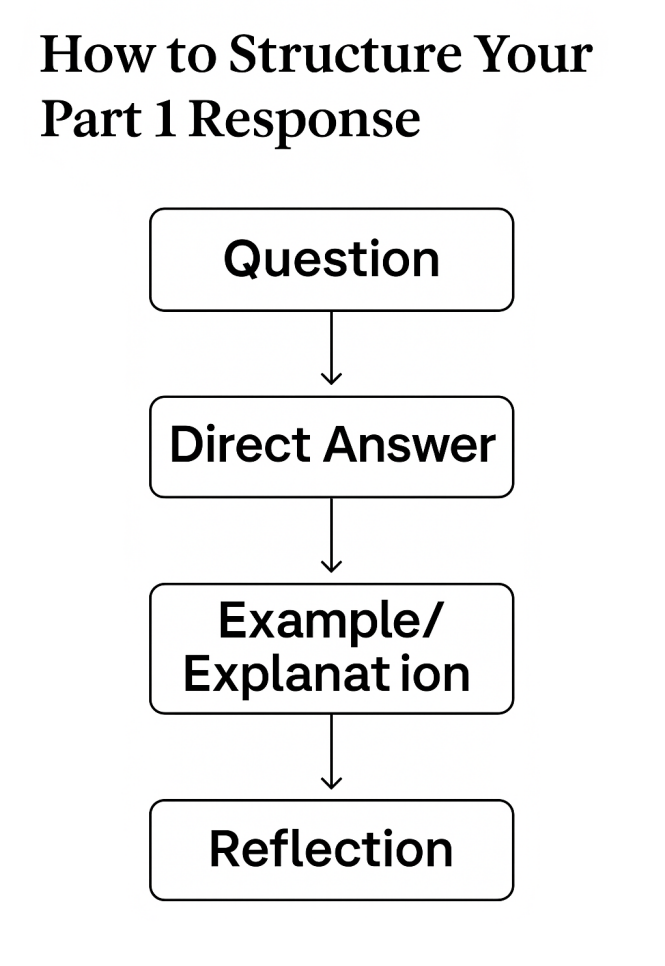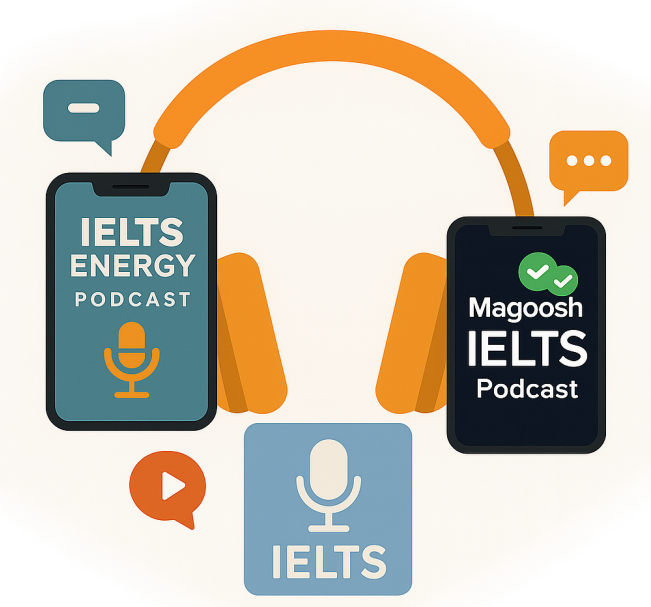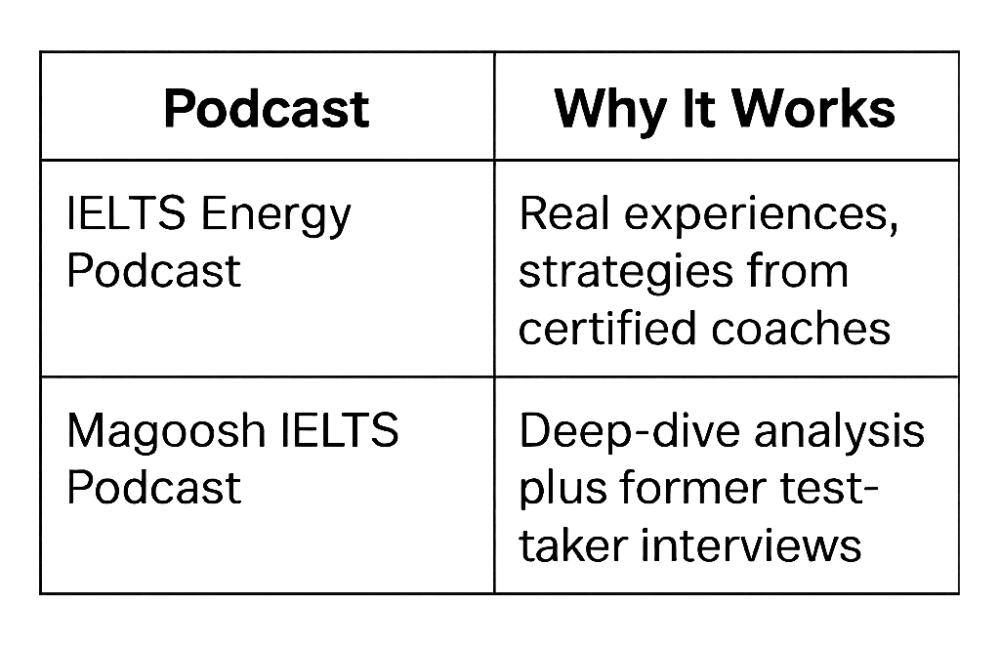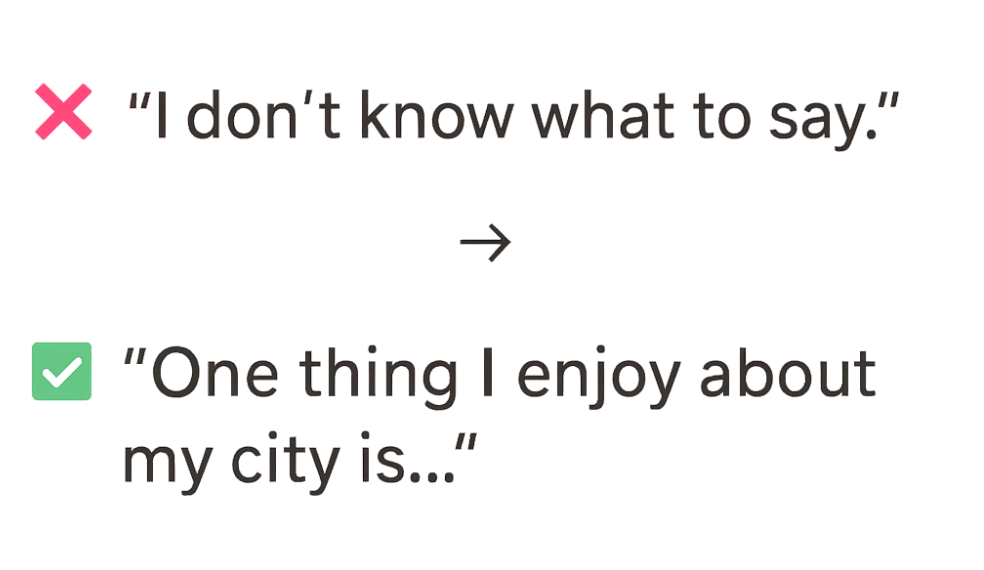
🎯Why the IELTS Speaking Test Matters
The IELTS Speaking Test is a crucial component of your English language proficiency assessment, especially if you’re aiming for academic or professional opportunities abroad. This part of the test is designed to evaluate your ability to communicate effectively in English, focusing on fluency, coherence, lexical resource, and grammatical accuracy.
Part 1 of the IELTS Speaking Test lasts about 4-5 minutes and includes questions about familiar topics, like your home, work, studies, and personal interests. It’s meant to be a warm-up conversation to ease candidates into speaking. But don’t underestimate its importance. Your performance sets the tone for the rest of the test, so getting it right is crucial.
⏱️ Duration: 4–5 minutes
🔍 Purpose: To evaluate real-life communication
🧠 Focus Areas: Fluency, vocabulary, grammar, coherence
🎧 Harnessing Podcasts for Smart Prep
Preparing for the IELTS test with the help of podcasts can be particularly effective because it simulates a natural English-speaking environment. This can help increase your comfort level when responding to questions. Implementing strategies learned from podcasts can also enhance your preparation. As we explore further, you’ll see how these insights can become part of your strategy to excel in the speaking test.
Podcasts are your portable prep partner. They:
- Build real-world listening skills
- Provide model answers and strategy breakdowns
- Share success stories from IELTS achiever
Podcasts are increasingly popular as a preparation tool for the IELTS speaking test. They offer unique benefits, like the flexibility to learn on the go and the ability to hear examples of fluent and structured responses. Listening to experts discussing strategies can provide you with insights that you might not get from traditional study resources. Additionally, podcasts often feature interviews with past test-takers who share their experiences and tips.
📝 Pro Tip Box
Shadow native speakers by repeating answers out loud. It trains rhythm and pronunciation naturally.
🧠 How to Answer IELTS Speaking Test Part 1
You’re asked about familiar topics like your hometown, hobbies, or work. Keep answers:
- Relevant
- Structured
- Naturally paced
- Rich with precise vocabulary

How to Answer IELTS Speaking Test Part 1
Approaching Part 1 of the IELTS Speaking Test requires a strategic mindset. You’re asked questions on familiar topics, which means the examiners want to see how naturally you can discuss everyday matters. Being prepared can make this process smoother and boost your confidence.
A key piece of advice for tackling these questions is to listen closely and ensure you understand what’s being asked before you respond. Examiners are looking for sensible, structured answers. Keeping your responses both coherent and concise helps showcase your ability to organize thoughts effectively.
Each question is an opportunity to exhibit your fluency, so speaking naturally without rushing is essential. Pausing to think for a second is fine, and can actually help you gather your thoughts to deliver a more polished response.
Incorporate a variety of vocabulary to demonstrate your lexical resource. Using different words that relate to the same topic can add richness to your responses. It’s not necessary to use complicated language—choosing the right words for the context is what’s important.
Practicing typical Part 1 questions is crucial in preparation. Reflect on potential answers and rehearse speaking them out loud. This kind of practice builds familiarity with the test format and boosts confidence, making it easier to convey your thoughts clearly under test conditions.
🎙️Which Podcast is Best for IELTS Preparation?

Choosing the right podcast can be a game-changer in your IELTS preparation journey. A good podcast should offer authenticity, expert insights, and practical strategies that you can easily integrate into your daily practice.
Consider podcasts hosted by certified IELTS trainers or English language educators. These sources are more likely to offer accurate and reliable information, given their expertise and experience in instructing candidates.

IELTS Energy Podcast is one of the popular choices among test-takers. Hosted by seasoned professionals, it provides insights across all test sections, including useful tips for Part 1 speaking. The focus on real-life experiences and practical strategies makes it a well-rounded resource.
Another excellent option is the Magoosh IELTS Podcast. Known for its in-depth coverage and expert advice, Magoosh regularly features interviews with former test-takers who share their tips and experiences, offering a broader perspective on tackling the test.
Podcasts that include listener Q&A sessions can particularly enhance your learning. These episodes often address common concerns and tricky areas, offering tailored advice that can drive your performance up significantly.
Make sure the podcast you choose aligns with your learning style. Some might favor a structured, lesson-based format, while others prefer a conversational style. Both can be effective if they match your preferences and study habits.
Mastering a 9.0 IELTS Speaking Score: Tips from the Experts
Achieving a high IELTS speaking score, such as a 9.0, requires a strong command of English language skills, beyond just knowing the basics. It means demonstrating excellent fluency, coherence, and the ability to use a wide range of vocabulary and grammatical structures with ease.
First, understanding the scoring criteria is essential. The IELTS Speaking Test evaluates four key areas: fluency and coherence, lexical resource, grammatical range and accuracy, and pronunciation. Excelling in each of these is necessary to reach the top band scores.
🏆 Expert Tips for a Band 9.0 Speaking Score
To reach a 9.0 band, excel in these areas:
- 🗣️ Fluency: Speak smoothly and logically
- 📚 Vocabulary: Use a wide range of precise words
- 🏗️ Grammar: Complex structures with accuracy
- 🎵 Pronunciation: Clear, natural intonation
Fluency isn’t just about speaking quickly; it’s about speaking smoothly and maintaining a natural rhythm without unnecessary pauses or hesitations. Practicing with native speakers, whether in person or over language exchange platforms, can significantly improve this aspect.
Lexical resource requires you to use a variety of vocabulary accurately. A good technique is to learn synonyms and practice using them in context, which can help avoid repetition and demonstrate a broader language scope to the examiners.
Grammatical accuracy involves not just knowing the rules but applying them correctly in conversation. Regular practice with complex sentence structures and different tenses is beneficial. Using resources like grammar exercises from IELTS-centered podcasts can be useful for this.
Real-life success stories can offer valuable lessons too. Listening to or reading interviews with those who achieved top scores can provide inspiration and practical tips. They often share unique strategies or tricks that worked for them, which you might find applicable to your test preparation.
Starting Off Strong: How to Begin Speaking in IELTS Part 1
Kick off your Speaking Test Part 1 with:
- 🎯 Direct answers: “I live in…”
- 🧘♀️ Poised tone and body language
- 🧠 Familiarity with likely topics
- 🔁 Rehearsed phrases to ease into fluency
This initial interaction sets the tone for the rest of your exam, so making a solid first impression can ease any nerves and boost your performance overall.
One effective strategy is to start by clearly and confidently stating your responses. Beginning with a sentence that directly answers the examiner’s question ensures clarity right from the start. It frames your answer and guides you through the rest of your response.

Confidence can be bolstered with practice. Familiarize yourself with common topics and rehearse answering them aloud. Recording your responses and playing them back can help you assess your speaking speed, clarity, and use of vocabulary.
It’s normal to feel nervous, but taking a moment to collect your thoughts before replying can actually enhance clarity and coherence. This brief pause demonstrates that you’re thoughtful and considerate with your responses, which is often seen positively by examiners.
Using phrases to introduce your responses can help structure your speech and fill any potential pauses. Say you’re asked about your hometown, starting with, Im from… or In my hometown… organizes your thoughts before diving deeper into details.
🗨️ Sample sentence starter:
“I’m from Melbourne, which is known for its art and café culture…”
Finally, maintaining a positive mindset and visualizing a successful interaction can act as powerful tools against anxiety. By picturing a smooth discussion, you channel that energy into your performance and convey assurance and fluency, helping you conquer Part 1 with ease.
